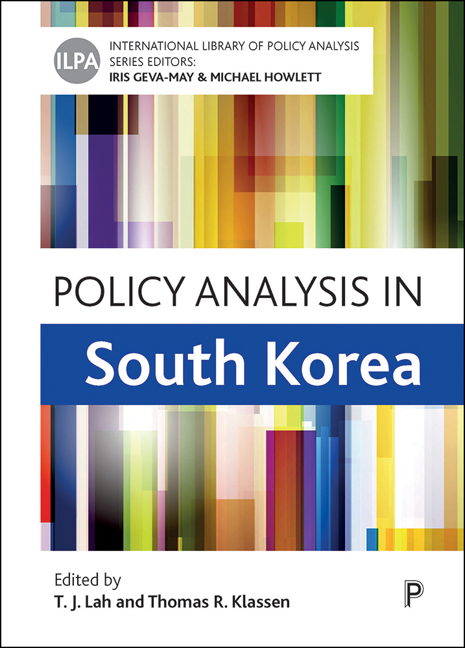Book contents
- Frontmatter
- Dedication
- Contents
- List of figures, tables and boxes
- List of abbreviations
- Notes on contributors
- Acknowledgements
- Editors’ introduction to the series
- Foreword
- Part One Overview of policy analysis in Korea
- Part Two Policy analysis by governments
- Part Three Committees, consultants, media, public inquiries and public opinion
- Part Four Parties, interest groups and advocacy-based policy analysis
- Part Five Academia, research institutes and policy analysis
- Index
nine - Policy advisory bodies in Korea
Published online by Cambridge University Press: 18 January 2024
- Frontmatter
- Dedication
- Contents
- List of figures, tables and boxes
- List of abbreviations
- Notes on contributors
- Acknowledgements
- Editors’ introduction to the series
- Foreword
- Part One Overview of policy analysis in Korea
- Part Two Policy analysis by governments
- Part Three Committees, consultants, media, public inquiries and public opinion
- Part Four Parties, interest groups and advocacy-based policy analysis
- Part Five Academia, research institutes and policy analysis
- Index
Summary
Introduction
Given the increasing complexity of the policy environment, it is becoming more critical for governments to solicit and use quality advice to effectively achieve a range of policy and programme outcomes. Accordingly, policy advice systems that affect policy formulation and government activities are now acknowledged to be key parts of the policy process. The provision of policy advice has been exhaustively studied in terms of who provides policy advice, how such advice is organised, and what kind of outcomes and impacts are achieved. At the same time, academics and practitioners have paid increasing attention to the nature and sources of policy advice, as well as its role in the policymaking process. Considerable progress has been made through the examination of policy advisory practices in different countries. However, much of this research is based on anecdotes, with relatively few systematic attempts to accurately understand and describe the nature of such policy advice practices. In particular, while there have been many case studies on Western countries such as the US, UK, Australia, Belgium, New Zealand, the Netherlands, France, Germany and Canada (Weller and Stevens, 1998; Page and Jenkins, 2005; Hoppe and Jeliazkova, 2006; Rochet, 2004; Fleischer, 2009; Howlett and Newman, 2010 Howlett and Wellstead, 2011; Hustedt 2013), fewer studies have been conducted on Asian countries (van den Berg, 2017). Moreover, few studies have been conducted to explain the differences in policy advisory bodies between countries (van den Berg, 2017).
Thus, this study aims to fill the gap in international literature on policy advisory bodies by examining such bodies in South Korea. In South Korea, policy advisory councils in the central government serve the function of providing professional opinions and assisting in decision making through deliberation, mediation and consultation. As of June 2019, there were 22 presidential, 56 prime ministerial and 496 ministerial policy advisory councils in the Korean central government. In reviewing Korean policy advisory bodies, we seek to answer the following questions. First, how and why were these advisory bodies established? Second, what do the operations of these bodies tell us about the nature of policy advice?
To focus our investigation, we analysed advisory committees, a particular type of advisory body that has been established by the government at the national level in South Korea.
- Type
- Chapter
- Information
- Policy Analysis in South Korea , pp. 117 - 136Publisher: Bristol University PressPrint publication year: 2023

